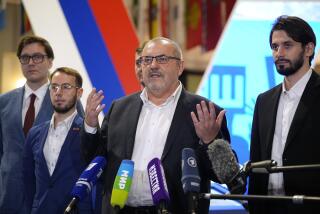Yeltsin Bigger Than Life and Russians Love Him : Profile: Voters grant him the power that he longed for. And now the radical reformer must deliver.
- Share via
MOSCOW — When Boris Nikolayevich Yeltsin was graduating from the seventh grade, he stunned a school assembly by publicly denouncing the mean teacher who had cowed most of his classmates into submitting to her whims.
When he was a little older, he blew off two of his fingers when his curiosity led him to take apart a hand grenade.
And the summer after the ninth grade, he led a group of friends on a camping trip into the wilds, and--as he tells it in his autobiography--they all might have died of typhoid if young Boris had not used his last ounce of strength to carry them to a boat and steer them downriver toward home.
This is the man that the Russian Federation has chosen as its first popularly elected leader--virtually fearless, bigger than life and perhaps, frighteningly, just a little foolhardy.
Just as he risked his school diploma to speak out against his teacher, Yeltsin risked his leadership position in the Communist Party to speak out against President Mikhail S. Gorbachev in 1987, accusing him of taking the process of reforms too slowly.
Like the childhood grenade, the move blew up in his face, costing him his post as the Communist Party chief of Moscow and membership in the ruling Politburo.
But Yeltsin was politically resurrected by the Soviet Union’s first free elections in 1989, and the 60-year-old former construction engineer went on to a brilliant political move, setting up the vast federation, the largest Soviet republic, as his power base, becoming first the head of its Parliament and, now, its president.
When a short description is called for, Yeltsin is generally tagged as a radical populist because of his push for fast, hard-hitting economic reform--the kind of accelerated reform Gorbachev has shied away from for fear of its human costs--and his claims that it can be done relatively painlessly.
But the most salient political fact about Boris Yeltsin is that the Russian people love him. They love him a whole lot more than they care for Gorbachev.
They are taken by his peculiarly Russian brand of charisma, by his genius for survival and his promises to restore Russia to its former greatness.
Yeltsin is physically imposing. He towers above most Russians, his sweep of white hair gleaming above his puffy face, and the boom of his voice from the depths of his barrel chest expresses anger and determination.
His message, from the beginning, differed sharply from Gorbachev’s urgings for gradual reform. It was Yeltsin who launched the Soviet political equivalent of the outpouring of rage in the movie “Network,” the collective shout of, “I’m mad as hell, and I’m not gonna take it anymore!”
The Russian masses loved Yeltsin first as a martyr, punished for speaking the truth. Then, as his confrontations with Gorbachev came to dominate Soviet politics in the last year, they admired him for his courage in standing up to the Kremlin, his insistence that he would not sacrifice Russian interests to the leadership’s dictates.
“If he comes to power, he’ll change the whole system,” Margarita Oreshnikova, a retiree in the Russian town of Tulaearance, said last month. “All our hopes are pinned only on him.”
The Gorbachev-Yeltsin rivalry grew more and more worrisome, however, particularly when Yeltsin, in a televised address last February, called for war to be declared on Gorbachev.
Public calls mounted for a reconciliation. It came April 23, when Gorbachev, Yeltsin and leaders of eight other republics signed a declaration on the basic outline for their future power-sharing.
Moscow Mayor Gavriil Popov contended Thursday that Yeltsin’s personality was not vital in this election, that issues dominated the voters’ thinking.
In fact, Yeltsin’s personality, the inner man who interferes with his public persona, could be considered something of a liability.
Yeltsin has admitted to being prone to rages and depressions and to using dictatorial methods. A recent article in the Communist Party newspaper Pravda accused him of being intolerant, disloyal, opportunist and hungry for power.
He has driven himself to physical collapse and gotten into repeated scrapes, ranging from a mysterious incident in which he reportedly fell into the water from a suburban bridge to his embarrassing apparent drunkenness through much of a 1989 U.S. trip.
But with his temper and his underdog’s battle against the Kremlin, Yeltsin has made a magnificent opposition hero.
Now, holding all the powers he has asked for to transform Russia as he will, Yeltsin will show whether he has true greatness--whether he has as much ability to build as he does to tear down.
More to Read
Sign up for Essential California
The most important California stories and recommendations in your inbox every morning.
You may occasionally receive promotional content from the Los Angeles Times.













